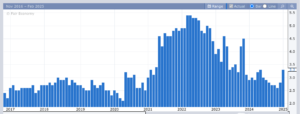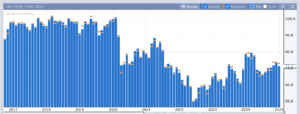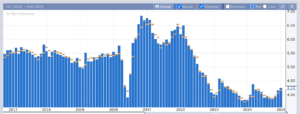Analyses
Weekly Crypto News Summary (April 22 – April 28)

QUICK OVERVIEW
- The new EU crypto regulation has been accepted
- Archax tokenized one of BlackRock’s funds on Hedera
- The SEC would fine Terraform Labs and Do Kwon $5.3 billion
- Strike bitcoin payment app launches services in Europe
- Immutable initiates a $50 million reward program
- The company behind MetaMask wallet sued the SEC after being accused of unauthorized broker-dealer activities
- The founders of Samourai Wallet were arrested, leading to Phoenix Wallet and Wasabi Wallet banning US users
USA’s Battle with Crypto
On Wednesday, federal prosecutors charged the founders of the coin mixer Samourai Wallet, Keonne Rodriguez and William Lonergan Hill, with conspiracy to launder money. The Samourai Wallet website and mobile app were blocked by US authorities. The arrest of Samourai Wallet’s founders follows the arrest of the co-founders of Tornado Cash, an Ethereum-based mixer protocol. In both cases, DOJ prosecutors argued that the mixer service’s deliberate profit from criminal use is sufficient for the charge of money laundering. Industry advocacy groups have advocated defenses to protect the freedom of speech of open-source developers.
Phoenix Wallet, one of the most important Bitcoin wallets designed specifically for Lightning Network payments, announced that the wallet will be removed from US app stores on May 3, 2024, and US users are advised to empty their wallets. This announcement was followed by Wasabi Wallet, another open-source, privacy-enhancing Bitcoin wallet. The zkSNACKs development team announced that access to the wallet and other services will be suspended indefinitely for users from the United States. Both wallet developers were forced to make their decisions after the arrest of the founders of Samourai Wallet, which has similar privacy features, on charges of enabling money laundering.
Consensys, the software company of Joseph Lubin, one of the co-founders of Ethereum, filed a lawsuit against the US Securities and Exchange Commission (SEC) in a federal court in Texas. The lawsuit revealed that the company received a Wells Notice from the SEC on April 10, accusing the company’s wallet service, MetaMask, of operating as an unauthorized broker-dealer. The purpose of the lawsuit is to prevent an impending SEC lawsuit against Consensys for the popular crypto wallet features and to obtain an official statement from the SEC that Ethereum’s digital token, Ether, is not a security.
The Federal Bureau of Investigation (FBI) issued a warning to Americans not to use services of crypto companies that are not registered as Money Services Businesses (MSBs) under federal law and do not comply with anti-money laundering rules. The FBI also advised users to check the US Financial Crimes Enforcement Network (FinCEN) website to see if the company is registered as a money service business.
Other Regulations
On April 24, the European Parliament approved new regulations requiring crypto asset companies to conduct official due diligence for anti-money laundering purposes. Under the new rules, crypto asset service providers (CASP) falling under the Markets in Crypto-Assets Regulation (MiCA) will be required to conduct due diligence on their customers, verify their identities, and report any suspicious activities to authorities.
Project Investments
The team behind the memecoin Shiba Inu raised $12 million through a forthcoming TREAT token sale to develop their new, privacy-focused layer 3 blockchain. The project received contributions from names like Polygon Ventures, Mechanism Capital, Big Brain Holdings, Shima Capital, Animoca Brands, Morningstar Ventures, Woodstock Fund, DWF Ventures, Stake Capital, and Comma 3 Ventures.
Aligned Layer, one of the projects that will run through the restaking EigenLayer protocol, raised $20 million in a Series A financing round led by Hack VC. The project will serve as a verification layer for receipts generated by layer 2 dapps. Supporters include DAO5, Iterative Layer, Nomad Capital, and Finality Capital.
Web3 gaming platform Immutable announced a $50 million reward program. Starting today, players can receive instant rewards by completing missions, playing games, and owning Immutable collections. The ecosystem boasts over 270 projects under development, including high-profile gaming projects like Illuvium and MetalCore.
San Francisco-based Movement Labs raised $38 million in a Series A financing round led by Polychain Capital. The project aims to manage the vulnerabilities of smart contracts through the Movement zero-knowledge layer 2 blockchain, increase transaction throughput, and primarily bring the Move Virtual Machine to Ethereum.
Blockchain Developments, Partnerships, Web3, and DeFi
Web3 infrastructure provider Ankr announced the launch of the public testnet for its AI-focused new layer 1 blockchain, Neura. Neura allows developers to build decentralized applications that combine AI, cloud computing, and blockchain technology. ANKR token will function as the native crypto asset on the blockchain, with plans for the mainnet launch soon.
Aethir and Io.net jointly announced a partnership to democratize access to high-performance computing worldwide. As part of the collaboration, Aethir will integrate its high-performance GPUs into Io.net’s extensive decentralized infrastructure, creating a network of 640,000 GPUs and CPUs.
Popular NFT marketplace Magic Eden launched its new platform, the Magic Eden Runes Platform, with its beta version now available. Users can swap BTC on the platform and purchase Runes and Ordinals using their Magic Eden wallets.
London-based Archax, the first FCA-regulated digital asset custodian, expanded its tokenization services to the BlackRock ICS US Treasury Money Market Fund (MMF) on the Hedera blockchain. This service, done in collaboration with the HBAR Foundation, marks a significant step in merging traditional financial assets with blockchain technology.
The Strike bitcoin payment app announced the launch of its services in Europe. Strike’s “Send Globally” feature allows eligible customers to conduct fast and inexpensive local currency transfers using the Bitcoin Lightning Network, as well as support for bitcoin purchases, sales, sending, and receiving. The service is available in Hungary as well.
With the upcoming mainnet launch, Avail announced that Ethereum layer 2 networks such as Arbitrum, Optimism, Polygon, StarkWare, and zkSync will be integrated into its modular blockchain data availability architecture (DA). The integration aims to assist developers in creating more scalable and cost-effective chains and ensure that all necessary transaction data is openly accessible.
Regulatory Procedures and Hacks
Mt. Gox victims reported that the trustee overseeing the liquidation updated the amounts to be refunded and added the completion date for the refunds. Statements revealed that payments are currently being made. The trustee of the liquidation platform announced in September 2023 that victims would be refunded 142,000 bitcoins and 143,000 bitcoin cash, as well as 69 billion Japanese yen ($510 million) in fiat currency by October 2024.
A group of cybercriminals published the source code of the software used in the bitcoin ATMs maintained by the government of El Salvador. Unfortunately, this is not the first serious breach of the Chivo wallet. The system associated with Chivo operating in El Salvador has been hacked several times since its debut in 2021, most recently at the beginning of the month when a hacker released more than 5 million high-resolution photos of almost every adult in El Salvador, including detailed contact information.
The US Securities and Exchange Commission found Terraform Labs and its co-founder, Do Kwon, responsible for the 2022 collapse of Terra-Luna and requested a $4.7 billion fine against the two parties. Additionally, the SEC requests the court to require Terraform and Kwon to pay civil penalties of $420 million and $100 million, respectively.
The Venezuelan state oil company, PDVSA, increasingly plans to use Tether’s stablecoin, USDT, in its oil transactions as the United States recently decided to impose new sanctions against the country. The corporate decision aims to minimize risks of freezing profits from oil sales due to US sanctions on offshore bank accounts.



